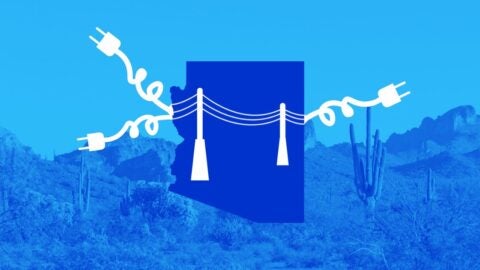Trump breaks his “jobs” promise in proposal to gut Clean Car Standards

In March 2017, President Trump held a high-profile event in Ypsilanti, Michigan to announce that his administration was re-opening the mid-term evaluation of America’s Clean Car Standards. He was joined at the event by the CEO’s of General Motors, Toyota, Fiat Chrysler, and Ford among others.
His action that day kicked-off a process that culminated in today’s release of a proposal that would eviscerate those successful standards.
The Trump administration’s attack on the Clean Car Standards threatens our health and environment, will raise costs on American families, is at odds with the technical progress the industry is making to reduce vehicle pollution, contains attacks on state-authority that are flatly illegal, undermines our safety, and is based on a deeply flawed and biased analysis.
The attack also goes against the purported rationale the President gave in March 2017.
President Trump wanted us to believe that this action was all about jobs. He mentioned “jobs” 14 times in his speech, noting:
“If the standards threatened auto jobs, then commonsense changes could have and should have been made.”
He also said:
“We are going to ensure that any regulations we have protect and defend your jobs.”
The odd thing is that the Trump administration’s own analysis finds that its proposal is a job loser.
That’s right: the administration’s own assessment found that its proposal would cost at least 60,000 jobs (Table VII-5; page 784 and 785).
This number is a low estimate too, as it fails to include “adjacent employment” – such as the cook at a diner next to the factory, or the economic growth from the $5,000 to $8,000 in savings families gain by driving cleaner cars.
Losing 60,000 jobs under President Trump’s plan stands in stark contrast to the progress made since the adoption of the Clean Car Standards. This program has coincided with record years of vehicle sales and the addition of 700,000 auto industry jobs.
A recent analysis by the Blue Green Alliance found that 288,000 American workers “are building technology that improves fuel economy for today’s innovative vehicles.” In response to the proposal today, the group noted today that:
“[W]alking back from the nation’s current strong fuel economy standards is a mistake, plain and simple.”
The United Automobile Workers has noted that their members “know firsthand” that these standards “have spurred investments in new products that employ tens of thousands of our members.” The group’s president, Dennis Williams, recently stated that he did not support the administration’s efforts to rollback these standards noting: “We had an agreement … I don’t think that we ought to be rolling back the standards. I think we ought to use some common sense here.”
Automotive suppliers know about jobs too – they directly employ more than 871,000 Americans. A large coalition of these companies recently urged the administration to “maintain[] strong national standards.”
The 60,000 job loss figure is likely low for another reason too – it fails to account for the cost of ceding innovation and technology leadership to other countries. China is now the dominate market for global vehicles sales, and its long-term commitment to zero-emission vehicles remains strong.
The next generation of American automotive jobs will be at companies that lead the global transition to zero-emission vehicles. For example, Synapse Energy Economics recently found that embracing vehicle electrification by itself stands to create – for Ohio alone – more than 9,000 jobs and $900 million in annual Gross Domestic Product.
The Trump administration’s proposal undercuts U.S. innovators, and undercuts U.S.-based jobs making the cars and trucks that would be the leaders in both U.S. and global innovation.
The Trump administration’s vehicle proposal fails the President’s own supposed test – it threatens auto jobs rather than protects them. The Trump administration knows this, as its very own analysis makes this clear.
Today’s damaging proposal reveals that the Trump administration’s attack on our nation’s successful Clean Car Standards was never about jobs. If the Trump administration wants to protect U.S. auto jobs and the well-being of American families, it should withdraw this proposal immediately.













One Comment
It really is possible that you have not been finding things easy at just.
In so doing, you relate positively these people not only survived yet they went on to WIN! http://oxfordsy.com/vb/index.php?action=profile;u=1363